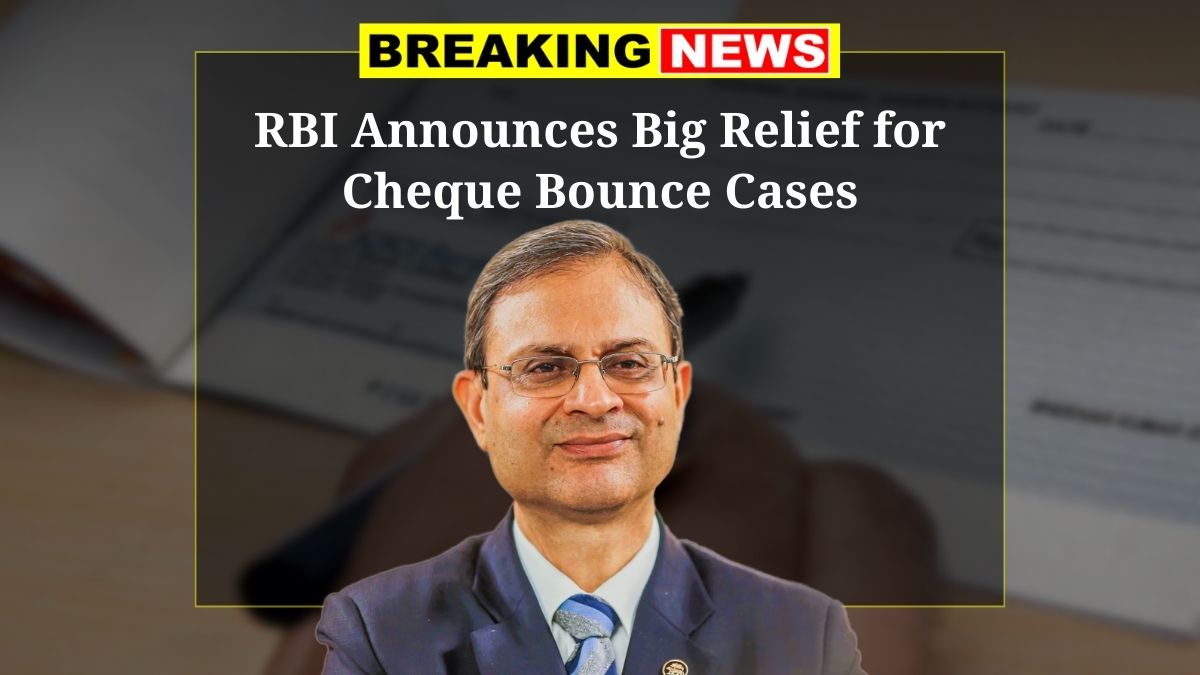RBI New Rules : Cheque bounce cases have long been a headache for both banks and their customers. While digital payments are gaining momentum, cheques still play a significant role in personal and business transactions. However, when a cheque bounces, it often leads to legal trouble, stress, and delays.
To tackle this issue, the Reserve Bank of India (RBI) has introduced a fresh set of rules to make the process smoother, faster, and more transparent. These new guidelines, which aim to streamline cheque bounce cases, will affect everyone from business owners to salaried professionals and occasional cheque users. Here’s what you need to know.
What Exactly is a Cheque Bounce?
A cheque bounce occurs when a bank is unable to process a cheque. This can happen for several reasons, including:
- Insufficient funds in the account
- Wrong signature
- Expired or post-dated cheque
- Closed account
- Stop payment instructions from the issuer
Cheque bounce is a serious issue under Section 138 of the Negotiable Instruments Act, 1881, and can lead to legal action, including potential jail time. Despite its serious implications, many cases end up dragging on in courts for years.
Key Changes in RBI’s New Cheque Bounce Guidelines
The RBI has now implemented measures to reduce misuse, speed up the process, and reduce the burden on the courts. These new rules are designed to bring discipline to cheque transactions and ensure faster actions from banks.
Highlights of the New Guidelines:
| New Guideline | What It Means |
| Quick Notification | Banks must notify customers within 24 hours if a cheque bounces, via SMS or email. |
| Account Freeze Policy | Habitual defaulters will be flagged in the RBI’s internal system, with alerts sent to other banks. |
| Standard Penalties | Penalties for cheque bounce will be uniform across banks, eliminating confusion. |
| Red Flag System | A system to mark habitual defaulters, making it easier for banks to track offenders. |
| Cheque Book Ban Discouraged | Banks are discouraged from banning cheque books completely for defaulters. |
Why These Changes Matter
These updates aim to protect both customers and banks, offering a fairer system and faster resolution for everyone.
Benefits for Customers:
- No Surprise Penalties: Customers will be notified of penalties within 24 hours, giving them time to fix the issue before facing serious consequences.
- Better Communication: With more transparency from banks, customers will know exactly what’s going on with their cheque transactions.
Benefits for Banks & NBFCs:
- Faster Resolution: These new rules make it easier for banks to address issues quickly, improving customer trust.
- Reduced Legal Costs: With fewer cases dragged out in court, banks will save money on legal proceedings.
Businesses: What You Need to Do
If you’re a business owner, especially one still using cheques for payments, here’s what you can do to avoid issues:
- Keep Track of Cheques: Maintain proper records of all issued and received cheques.
- Switch to Digital Payments: Whenever possible, use digital payment methods to minimize the risk of bounced cheques.
- Educate Your Team: Make sure your staff understands the new RBI guidelines and is prepared to act on bounced cheques quickly.
What Happens If Your Cheque Bounces?
- First Offense: Penalty of ₹150-₹300, plus an SMS/email warning.
- Second Offense: Penalty of ₹300-₹500, plus a red alert.
- Third Offense: Penalty of ₹500-₹1000, plus temporary account freeze.
- Fourth and Beyond: Penalty over ₹1000, plus legal escalation and red-flagging.
Is Cheque Bounce Still a Criminal Offense?
Yes, cheque bounce remains a criminal offense under Section 138 of the Negotiable Instruments Act. However, the RBI’s new guidelines aim to resolve issues earlier in the process, before they reach the courts. With faster notifications, digital tools, and an effective red-flag system, many cheque-related problems will now be addressed more quickly.
The RBI’s updated guidelines are a major step forward in streamlining cheque bounce cases in India. By introducing quicker notifications, standardized penalties, and a red-flag system, these rules aim to reduce delays, make the process fairer, and encourage responsible cheque use. Whether you’re a customer, business owner, or bank, it’s time to adapt to these changes for a smoother, safer banking experience.




